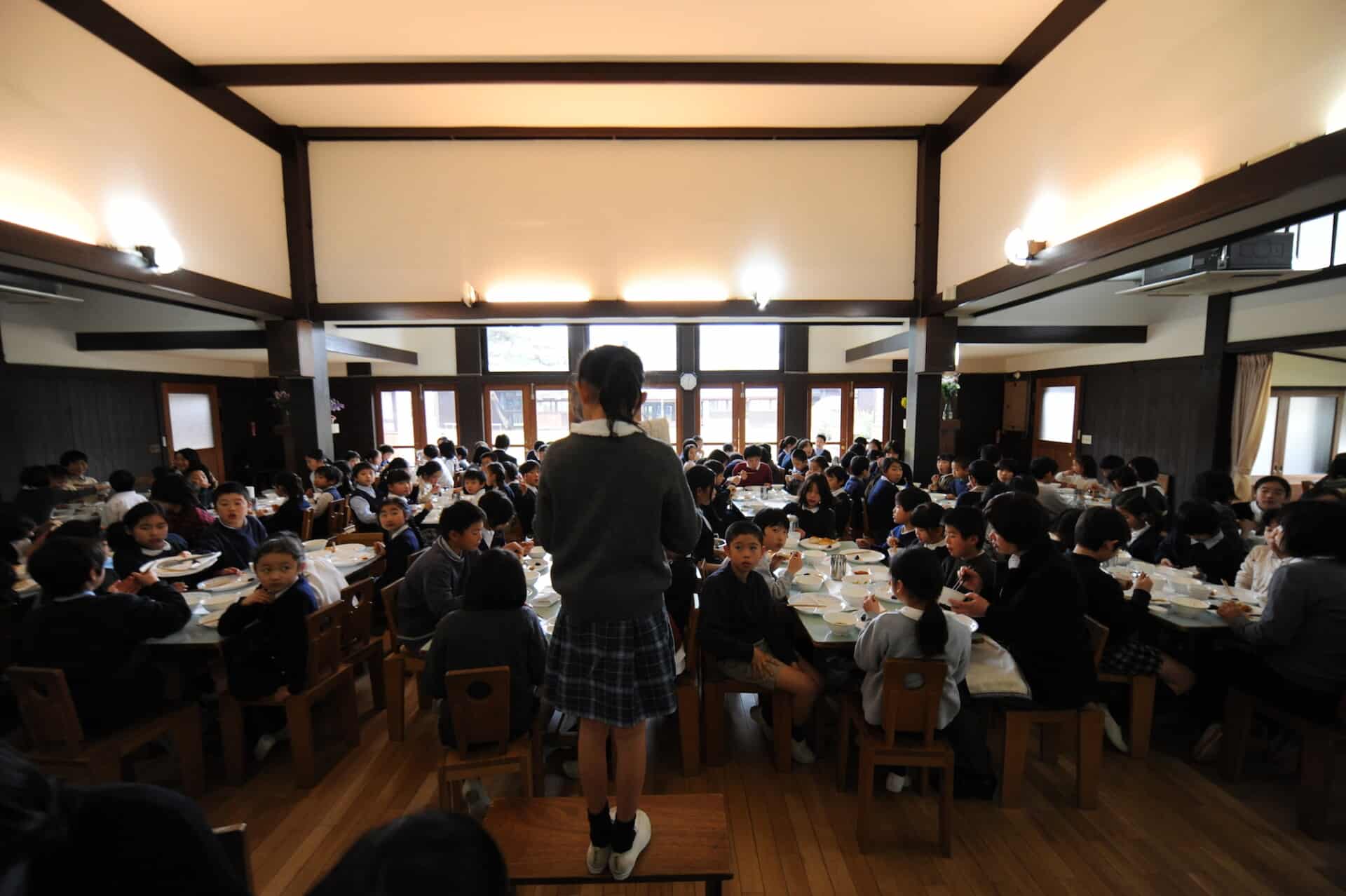
Jiyu Gakuen Interview No.2 “The History of the Food Office and Learning from Cooking”
◼︎Supporting parents in accordance with their cooking experience
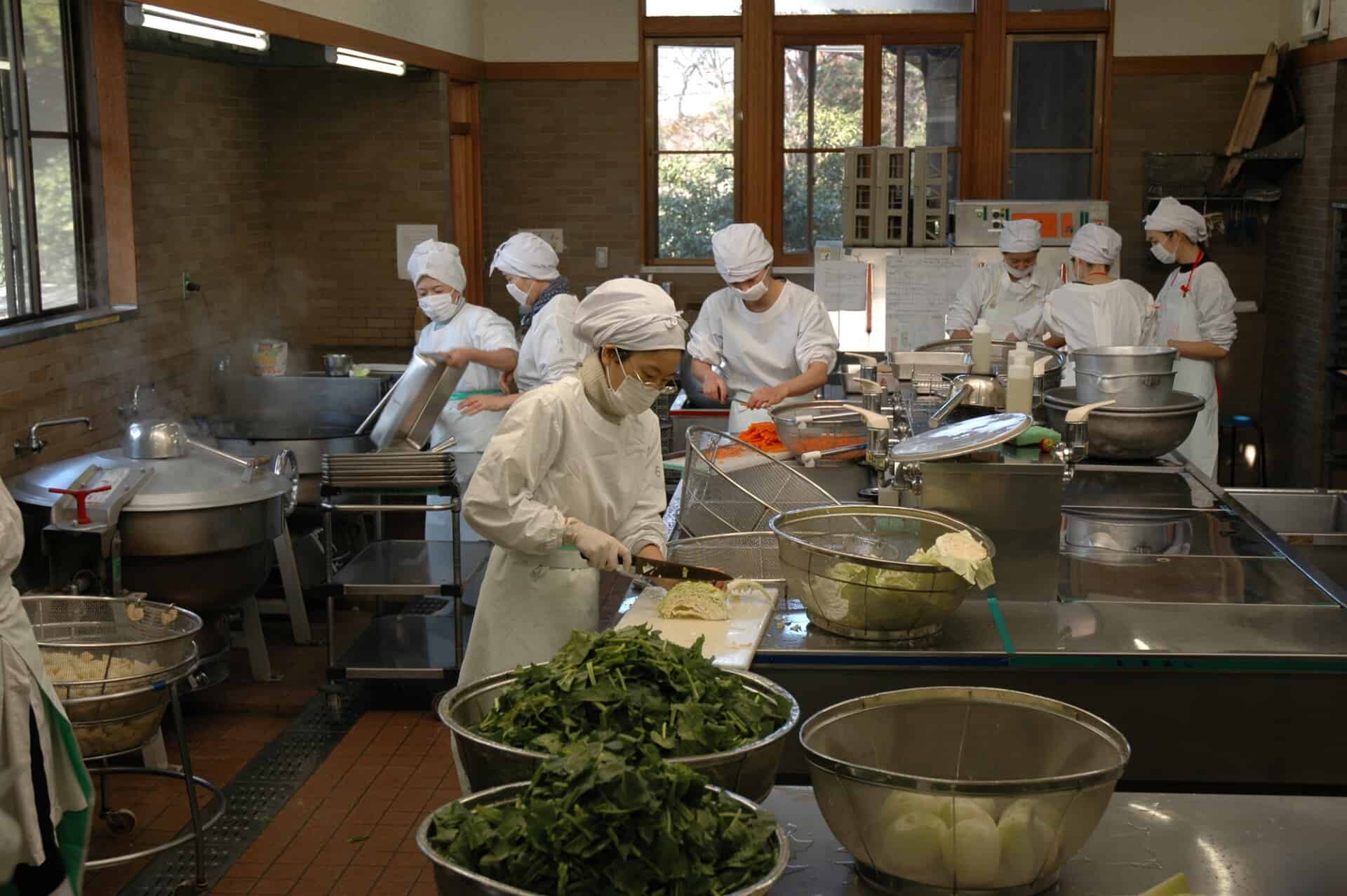
Cooking by parents at Shotoubu
Q: Let us hear of the work of the Food Office after you came to have no students in the Office.
A: (Ishikawa) There were the incidents of O-157 in Japan, and we started to introduce the staff who specifically took charge of kitchen hygiene to the group of parents who did the cooking. Even today, our staff in charge of kitchen hygiene goes to Shotoubu and the Boys’ Dept. to cook lunch with parents.
At first when the staff was placed in the kitchen, she would tell the parents to do this and not to do that, and then parents would regrettably say in reply to her that she was there to take charge of the hygiene matter only and not to intrude on the way of their cooking. However, the situation has been changing little by little.
Although the cooking at Jiyu Gakuen is a mass cooking and different from the cooking at home in the first place, perhaps the parents might have less cooking experience at home. Formerly, the staff in charge of kitchen hygiene took the position of basically not intruding on their cooking but of teaching them only when necessary, but nowadays she takes a stand that she is willing to answer whatever question they may have.
There are some parents who like to do cooking by themselves, but there are not a few parents who are worried about their cooking, not knowing how to cook. So the staff in charge of kitchen hygiene decides how to cope with the parents according to their needs.
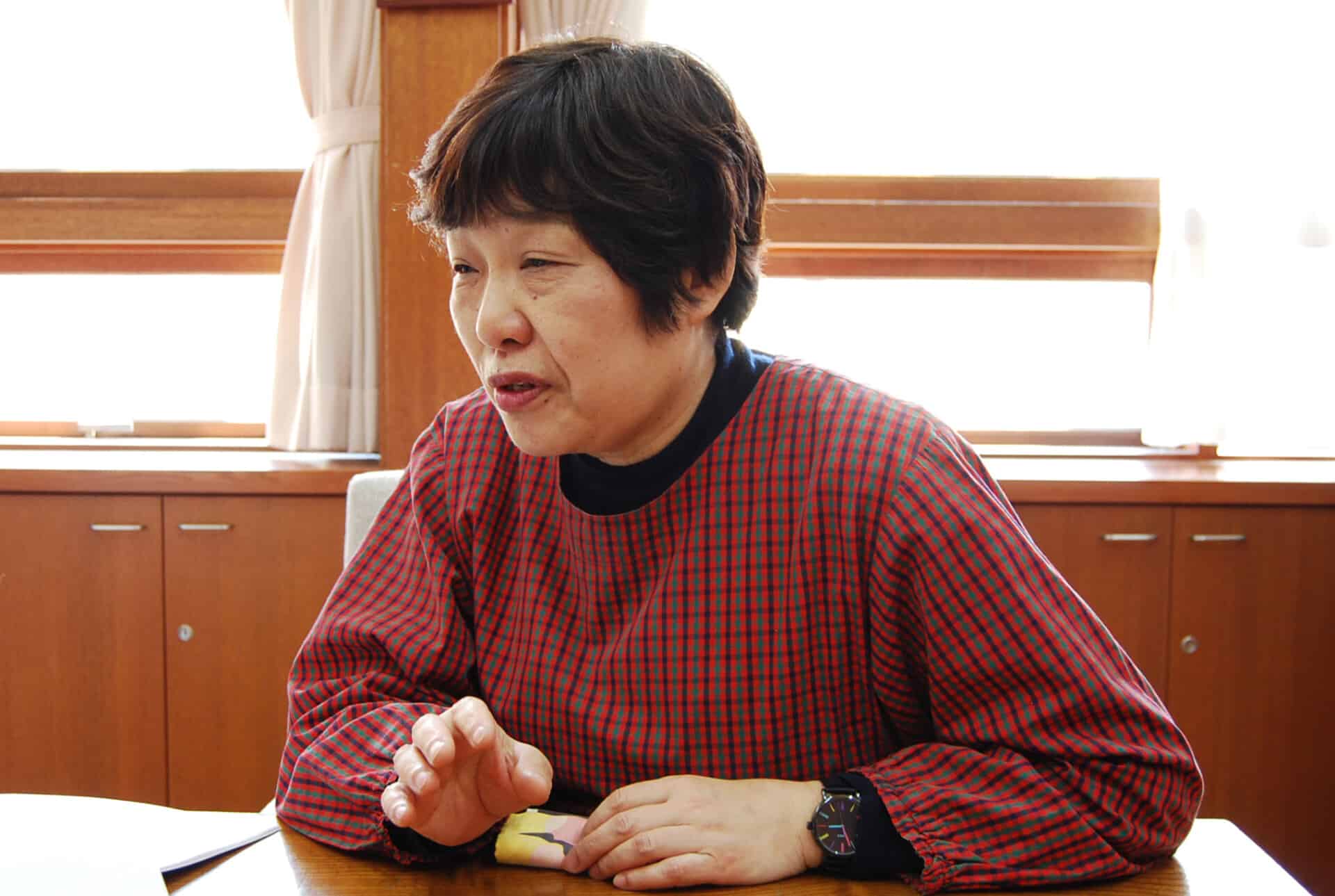
Mrs. Akiyo Ishikawa:
After graduating from Jiyu Gakuen Junior College, she worked with an
ordinary firm. And after her younger child entered Yoji Seikatsudan
(kindergarten of Jiyu Gakuen), she started working part-time at Yoji
Seikatsudan. In 1997 she began working full-time as a matron at the girls’
dormitory, and she moved to the Food Office in 1999. She has been
the head of the Office since 2009.
Q: You, Mrs. Ishikawa, are also a graduate of Jiyu Gakuen yourself, aren’t you?
A: (Ishikawa) Yes, I used to do cooking as a student of the Girls’ Department. And as my children entered Jiyu Gakuen, I would do cooking as a parent, too.
Q: You yourself graduated from Jiyu Gakuen, and your children entered the school, and further, you work at the Food Office now. You really love your alma mater, Jiyu Gakuen, don’ you?
A: (Ishikawa) Yes, but in fact I didn’t like the school much as a student for there was only work and work and work, because I was an idle girl! But when I went out into the society, I came to realize that I had various seeds planted in myself during my school days when I didn’t like to work at all. At the office of the company, everyone was surprised at what I did unintentionally. It was surprising to me as I wondered why they were surprised at such a thing like this.
Q: What was it that you did, for example?
A: (Ishikawa) It was a very small thing. For example, when I was asked to make a duplicate copy of some document, there was no copying machine with a sorting function. When asked to make 5 copies of the document, you would make 5 copies of one page at a time and you sort them in 5 sets later. But I thought it would be waste of time to wait for all the copies done and then sort them, so I started to get 5 copies starting from the last page of the document, and then I could sort them as the copies were being printed. Just a trifle like that.
Q: That means you have the ability to think for yourself, doesn’t it?
A: (Takahashi) I hear that a young graduate was admired for what he had done as a matter of course.
A: (Ishikawa) My daughter had the same experience. She got a job with a stationery firm and the first thing she was surprised at was this incident. That is when she got up to throw out the trash herself, she was told to leave it there as a cleaner would come and pick it up. When taking an inventory of the goods, she felt it was much easier than the work she had done at the Food Office. She was a member of the last class of the students who did the work for themselves there.
A: (Takahashi) Once there was a graduate who said, “How easy it is to live in society! Is it all right to get paid for such an easy job?”
Q: Conversely we cannot help but have doubts about the present society.
A: (Ishikawa) When I was with the firm, I had this experience. Just before the meeting was to begin, I thought of putting chairs in order and actually I did it. Then my colleagues got surprised, saying, “Who did this?” It was a matter of course if you thought of what was to come next. I didn’t realize while at school that I was learning always to think ahead.
◼︎The school to which they want to send their children, when students become parents

Scene at the dining hall of Shotoubu
(Ishikawa) To be honest, when we were raising our children, I was troubled with the idea of whether we should send them to Jiyu Gakuen or not. Especially in Yoji Seikatsudan (kindergarten) and Shotoubu (elementary school) I would have to do the cooking as a parent. It took me a very long time to decide, but eventually I made up my mind encouraged by my husband and my mother-in-law.
And still, I reluctantly went to cook lunch for children, thinking about why I was doing such a thing as this. But then and there, I learned much that was quite different from what I had learned as a student.
Q: What was it that you learned?
A: (Ishikawa) By sharing the time of the day for our precious children with parents whom I hadn’t known well and whose children belonged to other classes, I was made to grow much as a parent. For the same purpose of cooking lunch for children, you made effort to cooperate with the parents with whom you just happened to be in the same group on the day and with whom you might not necessarily be on good terms. It is hardly a common experience you could have.
Moreover, if someone discloses her troubled mind concerning raising children, saying, “My child didn’t do his homework yesterday,” or “He is scolded again for being always forgetful of the things,” she is encouraged by the senior mothers who say, “Don’t worry. Children are like that and you will see they will be able to do it without your knowing when.” And there is someone who offers you the used clothes, saying that they will surely fit your child, etc.
Q: It has become the place where you communicate with one another.
A: (Takahashi) You develop a sense of fellowship by working together. Our students have a sense of fellowship and the parents have it, too. Parents not only claim their rights at the Parents Meeting, but they become strongly united by supporting their children together.
Q: It is exactly a community, isn’t it?
A: (Takahashi) When I was a student at Jiyu Gakuen, my mother came to school to cook lunch for us. To my surprise, mothers still keep contact with one another while their sons have already graduated and don’t meet with one another. They go on trips together even now. How long has it passed since our graduation? The mothers’ relations with one another are incredible. They have their own life-long friends.
Q: Mr. Takahashi, how did you think of self-governing activities when you were a student at Jiyu Gakuen?
A: (Takahashi) I enjoyed various activities which were left in our hands.
A: (Ishikawa) Mr. Takahashi, you were willing and honest. I was full of doubts.
A: (Takahashi) The Girls’ Department was, sticking to tradition, more in good order than the Boys’ Department. Compared with the girls, boys were loose. However, I am very proud that we took care of ourselves for ourselves.
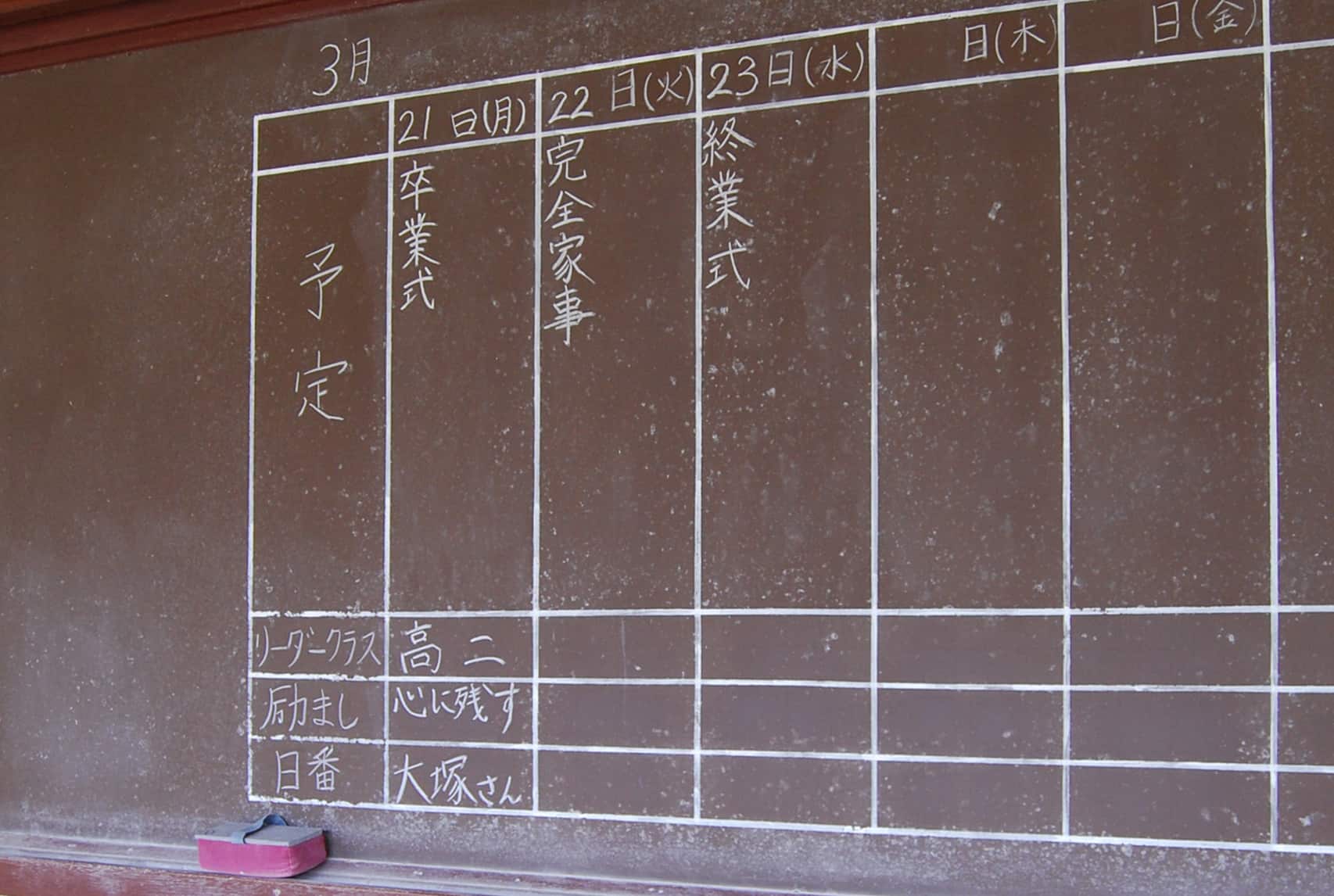
Schedule on the notice board. At the end of the term there is a day to complete the housekeeping work.
Q: I feel that the graduates of Jiyu Gakuen have the power of living and know how to live a good life.
A: (Takahashi) I have three children whom I started to send to Jiyu Gakuen when they became six. The oldest of the three just graduated from Jiyu Gakuen College this spring. Jiyu Gakuen was started by the founders who created the homemade, convincing school for their daughters when they thought there was no good school to educate them. I, myself, also chose Jiyu Gakuen as the school I wanted my children to attend, the school whose education I myself thought was really good. In my daughter’s class there were four students who were children of teachers at Jiyu Gakuen. Jiyu Gakuen may be a rare school where teachers send their own children (the ratio is very high).
A: (Ishikawa) As a student, I didn’t like Jiyu Gakuen much, but when it came to thinking about education for my own children, I studied about various schools and after all I wanted them to have the same experience here.
(to be continued)
投稿者プロフィール

- Organic,Natural,Farm to Tableに特化したフードプロデュース&オペレーションカンパニー。健やかな農と食とココロを結びます。
最新の投稿
コメント ( 0 )
トラックバックは利用できません。








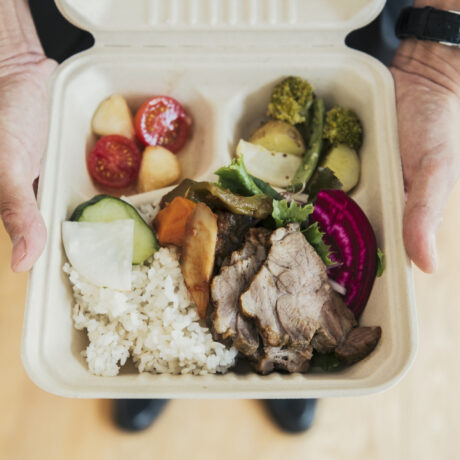






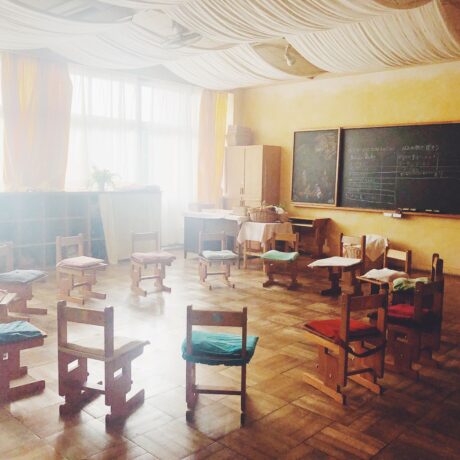
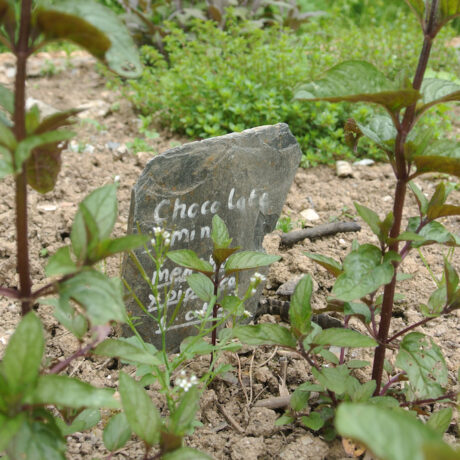
この記事へのコメントはありません。